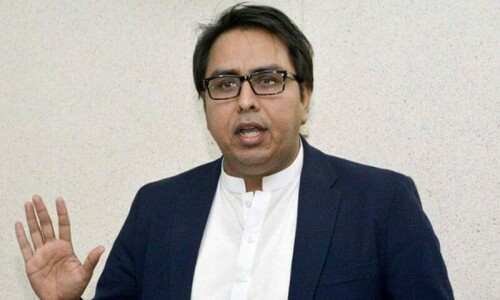Death brought down the curtain on the lives of two exceptionally gifted citizens over the past few days -- Professor Manzur Ahmad in Lahore and philanthropist Muhammad Shujaullah in Islamabad. Both deserve places of honour in the pantheon of national heroes.
Tall and erect till the last few months of his life, Manzur Ahmad was born in 1926 in Baghdad where his father was serving in the British Indian police. After a normal academic career he started teaching psychology at Lahore’s Islamia College. He was identified quite early in his career as a “corruptor of the youth” and later on as a doughty fighter for college teachers’ dignity and collective interests that led to his ouster from Islamia College.
Prof Manzur Ahmad came into his own as one of the founders and the first Principal of Shah Husain College. The courses of study offered by the college reflected the progressive vision of education Prof Manzur Ahmad shared with his senior colleagues and friends, including but not restricted to professors Eric Cyprian, Azizuddin Ahmad and Amin Mughal.
Apart from offering masters courses in English and Punjabi, the college offered instruction in computer sciences and film-making. The college also made a conscious effort to beak down the barriers separating the academia and the civil society and offered a platform for debate on issues of the moment. Some of the most candid discussions in the country on the East Pakistan crisis of 1970-1971 were held at Shah Husain College.
The end of the Ayub-Yahya military regime reopened the service opportunities Manzur Ahmad had been denied and while pseudo nationalisation of educational institutions sniffed out the brilliant experiment the founding of the Shah Husain College was, attempts were made to post Manzur Ahmad as far away from Lahore as possible, primarily to save the youth from being corrupted by him. Eventually he was posted at the MAO College, Lahore, where a way was found to protect the youth by asking Manzur Ahmad to put the college library in order. He retired from service on reaching the age of superannuation.
Prof Manzur Ahmad was known for long walks all over Lahore. He walked at a measured pace and refused to be distracted by inconsequential happenings around him. Likewise in life. He had a way of realising whatever he wanted without much of an hassle. He enjoyed hosting extended dinners for his friends and didn’t shirk taking up lost causes. Off and on he practiced clinical psychology. But even in retirement the young people remained the focus of his attention. During his last years he would retire to the park nearby and talk to the young people who were attracted by his towering personality.
Professor Manzur was cast in the mould for teachers who had a mission to accomplish. Unfortunately, that mould seems to have been shattered quite a while ago.
Muhammad Shujaullah
Before becoming a philanthropist with a difference, Shujaullah distinguished himself in several fields of life. He began as a teacher at a school in Ghora Gali and some of his pupils became famous generals in the Pakistan Army, including Generals Amjad and Mahmud Ahmad but unlike Aurangzeb’s teacher Mulla Jeevan, he sought no robe of honour from his star pupils. From teaching, like fellow teacher Khalid Hasan, he moved towards journalism and made many lifelong friends at the Civil & Military Gazette.
From journalism he leapfrogged into PIA’s cargo service and then into the managerial cadre. As PIA’s general manager in Dubai, Shujaullah drew up the foundation papers for the Emirates Airlines. Back in Pakistan at the end of 1980s, he served as PIA general manager Islamabad and Northern Areas and retired on reaching the age of superannuation.
Shujaullah joined the Human Rights Commission of Pakistan (HRCP) in 1992 as coordinator Islamabad office and Centre for Democratic Development on an honorary basis and served in that capacity till 2003. He drew no wages and drove all over the town in his personal car and paid for petrol out of his own pocket. The only charges he made on the HRCP was cost of travel to Lahore to attend the annual meeting of the Endowment Trust of which he was Secretary.
A man of independent mind, he could disagree with the HRCP policies but he never violated the commission mandate. He set examples of voluntary service that remains unmatched in HRCP’s history. Shujaullah did not marry and had no family of his own though his brothers and their families living in a Kharian village doted on him. He made his family by including in it a small state functionary and educating his sons and enabling them to stand on their feet and he bequeathed them the house he had built in Islamabad.
Muhammad Shujaullah gave his fellow beings much more than he took from them and he achieved a state of peace of mind only selfless servants of humankind can aspire to.
Published in Dawn, October 18th, 2020













































Dear visitor, the comments section is undergoing an overhaul and will return soon.